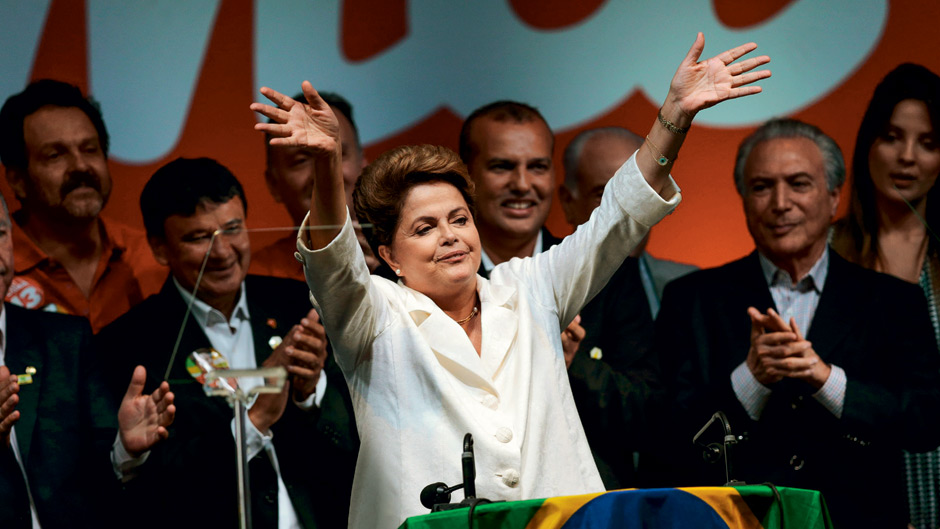Survival manual for the second mandate
The reelection of Dilma Rousseff will give the Workers Party (local acronym PT) 16 uninterrupted years in the Planalto Palace, the center of the Brazilian government. Experts point to risks in this situation, which is unparalleled in the history of Brazilian democracy, and suggest ways of protecting society from its harmful effects

Last Sunday´s reelection of president Dilma Rousseff highlighted an unprecedented feat by her PT party in Brazil´s democratic history: it won the electorate´s approval to remain in power for 16 uninterrupted years. Good for the PT but risky for Brazil. Alternating power is fundamental in maintaining democracy strong and refreshing its institutions. Society will now have to redouble its surveillance to ensure that the party in power does not fall into the totalitarian temptation to submit the country´s interests to its own. VEJA has spoken to specialists and lawyers who pointed out the areas that are most vulnerable to abuse by the party in the upcoming four years. Among the most threatened areas are the Congress, the Supreme Federal Court, the foreign ministry, known as the Itamaraty, and the free press.
WELFARE PRISONERS
THE DANGER: the PT perpetuating the one-way route that turns the 50 million beneficiaries of federal government programs into dependents and tied to the government. In the 15 states that Rousseff won in the second round of voting, beneficiaries of the Bolsa Familia program (under which households receive payments if they send their children to school and undergo regular health checks) represented an average of 43% of households. This compares with an average of 21% in places where she lost.
HOW TO RESPOND: defend a Congressional bill similar to that put forward by Marina Silva (the candidate who came third in the first round) during the campaign that calls for the adult beneficiaries of the Bolsa Familia program to take part in training schemes, such as technical learning courses. This would allow them to enter the labor market with the chance of obtaining better jobs and, at the same time, free them from being dependent on the government. A change like this would also enhance productivity.
TIGHTENING GRIP ON THE PRESS
THE DANGER: the president-elect comes under pressure from the PT to support the approval of a bill that the governing party calls the “social control of the media” – which is actually an attempt to censor the means of communication by controlling the content.
HOW TO RESPOND: the solution is to make sure that Congress does not allow any change that muzzles press freedom. The same goes for public opinion, the pressure of which forced the government to withdraw a large part of its National Human Rights Program 3, including guideline 22, that institutionalizes censorship, to all intent and purpose.
POPULAR COMMITTEES
THE DANGER: if the government insists in proceeding with Decree 8243/14 that gives “popular committees” the right to take decisions that are the responsibility of the Executive and Congress – a model that runs over representative democracy and is similar to that found in countries like Ecuador and Bolivia, with the ensuing results that have been seen.
HOW TO RESPOND: the House of Representatives overturned Decree 8243/14 last week but the measure still has to go before the Senate. If the government insists in pressing ahead, the Supreme Court will have to stop it. However, even if the Decree falls this time round, there is nothing to stop the government introducing another bill with a similar aim in the coming four years, as it has done in the past. Congress and society must remain alert to prevent any threat to the balance of powers.
FOREIGN POLICY
THE DANGER: if Brazil continues to finance dictatorships, as it did when it provided US$ 682 million to upgrade the port of Mariel in Cuba, and insists on pursuing a diplomacy marked by ideology and not by the national interest.
HOW TO RESPOND: on two fronts – by defending the independence of the foreign ministry (Itamaraty) which, before the PT government imposed its ideology, was recognized as a center of excellence in international diplomatic circles, and requiring that contracts by the national development bank, the BNDES, should not be classified as secret. This was the case with the Mariel port loan and even Congress has no access to the terms of the deal.
SUPREME FEDERAL COURT
THE DANGER: the entry into the highest court in the land of a majority of judges backed by the PT would have the effect of subjugating its actions to the party´s interests. Rousseff will nominate six judges to the Supreme Federal Court in the coming four years and 10 of the 11 judges will have been nominated by the PT by the end of her mandate. By that time, Gilmar Mendes, who became a member during the presidency of Fernando Henrique Cardoso, will be the only judge not nominated by the PT.
HOW TO RESPOND: pressure should be put on the Senate to comply with its constitutional mission of interrogating and approving those recommended by the president for the Supreme Court. This mission has been neglected, with the Senate giving summary approval to the Planalto´s recommendations. Lawyer Ives Gandra Martins suggests having a list of 18 names drawn up by the Federal Council of the Brazilian Lawyers Association, the Public Prosecutor´s Office and three higher courts. These names would be forwarded to the president and she would make her choice based on the differences in profiles, a move that would increase impartiality and prevent any risk of cronyism.
INFLATION AND GROWTH
THE DANGER: that the Central Bank does not act independently or with any real conviction in fighting inflation at the same time as GDP growth remains low and unemployment rises.
HOW TO RESPOND: firstly, ensure that the Central Bank fulfills its function and does not tolerate inflation rising above the target of 4.5%. In its first meeting after the elections last week, the Central Bank´s monetary policy committee decided to hike base interest rates (known locally as the Selic rate) to 11.25%. Hopefully, this is a sign of a tighter grip being imposed following the election. However, without the help of the fiscal policy, i.e. cutting back on government spending, reducing inflation will require a bitter medicine of interest rates that will be a drag on economic growth. But was this not exactly what the PT said would happen if the PSDB came to power? Defending the currency and boosting growth is essential for the creation of a virtuous cycle in which investments expand, jobs are created, wages increased and wealth distributed.
PUBLIC ACCOUNTS
THE DANGER: Brazil being downgraded from ”investment grade”.
HOW TO RESPOND: demand that the government be responsible in terms of its budget and transparency. Following successive years of fiscal revelry and creative accountancy with public funds, there is no way out; either an adjustment is made or Brazil falls back to a situation in which the economy is lagging behind and uncertain. The result of this year´s accounts is tragic, the worst in two decades. The risk classification agencies are scrutinizing the figures and, if the public debt continues to rise, Brazil will be downgraded. Against this backdrop, interest rates will start to rise, it will be more difficult to attract foreign capital for long-term investments and Brazil´s growth potential will shrink. “There is a group of global investors ready to invest in Brazil because we pay interest rates of 12% a year but they will rethink their options if Brazil is downgraded because they will be forced to sell their assets,” said Tony Volpon, head of research for emerging countries in the Americas of the Japanese bank Nomura.
PERSONAL INVESTMENTS
THE DANGER: savers and investors losing money as a result of the volatility of financial investments.
HOW TO RESPOND: by putting money in traditional, conservative investments, such as fixed income funds linked to interest rates. The uncertainties on the international front, combined with the imbalances and weakness of the Brazilian economy have a direct effect on savers´ returns. If economic growth continues to be low, corporate earnings will grow at a slow rate and shares are not a very interesting investment choice in this situation. In the particular case of Petrobras, Brazil´s state-controlled oil giant, it will have to be seen whether the company will stop subsidizing the price of gasoline and diesel oil. Those who are averse to risk should look for investments in post-fixed fixed income funds with low administration rates or in tax-exempt securities. Livia Mansur, strategist at XP Investimentos, said Brazilians have already noted that the situation has become more risky. “We carried out a survey of clients´ choices and saw a clear migration towards more conservative investments. The Brazilian investor has really become much more cautious. The investor is usually optimistic but pessimism is now prevailing,” she said. A brighter outlook for investments would depend on the government making a radical change in its economic policy, a possibility that is still regarded as remote. “It would be really surprising, considering what has happened in the past, but would certainly bring favorable changes to expectations,” said William Eid, coordinator of the Center of Finance Studies at the Business Administration School of the Fundação Getulio Vargas. “The market and the economic scenario are extremely sensitive to expectation.” It just needs president Rousseff to understand this.
PUBLIC BANKS
THE DANGER: of Brazil´s national development bank, the BNDES, continuing to keep its coffers wide open, distributing subsidized loans to domestic giants, and the other publicly-controlled banks being used to inflate bubbles of consumption.
HOW TO RESPOND: once again, demand transparency from the government and stricter control in granting credit. The ordinary Brazilian pays sky high interest rates that are the highest in the world. The rate for an overdraft rose to 183% a year, the highest in 15 years — the result once again of the government´s “development” economic policy. Meanwhile, large companies pay an annual rate of 6% (below inflation!) for subsidized loans from the BNDES. This disparity has an enormous cost, estimated at over R$ 30 billion this year, that will need to be covered by the Treasury, i.e. from taxes. The banks which are controlled by the government and the political parties from the allied base, have expanded the amount of credit granted by 117% during the Rousseff years. Unless there is greater oversight, this policy will lead to an accumulation of toxic assets on the balance sheets of the state-controlled banks. This is a film with a sad ending that Brazil has seen before.
FUEL AND ENERGY
THE DANGER: an enormous hike in prices that have been kept artificially low in recent years and has led to a higher bill for the Treasury and Petrobras.
HOW TO RESPOND: eliminate the cross subsidies and encourage investments. This is another cursed legacy that Rousseff has left behind for herself. There will be no way out. Either the prices are given a minimum adjustment to fit in with the market view or Brazilians will continue to pay an unsustainable price for subsidizing fuel and electricity. The weight of the adjustment will be lower if the government follows stable, predictable and more reliable policies, thereby helping to increase investments. With rainfall already below its historic average, the level of the dams of the hydroelectric plants in the Southeast and Midwest has dropped to 19%, well below the level of 45% registered a year ago. The drought is directly affecting consumers in large parts of the country as well as companies. The federal government should act in a coordinated way with state governors and mayors to ensure that water is used properly. One good idea would be to have a campaign to prevent wasting water and energy.
They promise to remain on the streets
Thousands of Brazilians who are not members of political parties took to the streets to protest against corruption and call for changes during the final stretch of the second round of the election. This was the first time such an event had happened since the mass demonstrations of June 2013. This contingent of dissatisfied citizens was the origin of a group whose name, Vem pra Rua – “Come onto the Street” – is a reference to the war cry launched during last year´s protests. Although its members had supported the opposition presidential candidate, Aécio Neves, the group does not regard itself as being linked to any party. One of its organizers, businessman Rogerio Chequer, 46, said the choice of the PSDB candidate had been due to the circumstances. “You could not sit on the fence in the second round and we are against making blank protest votes. In that situation, Aécio Neves was the candidate who offered the best prospect for change. However, our message is not linked to any party. Are you angry? If so, then join this cause. The aim is to unite those who are dissatisfied.”
Now, with the elections over, the “Come onto the Street” movement wants to keep alive the feeling of anger from which it originated. Its founders aim to operate as monitors of Congress and return to the streets at any sign of moves they see as benefitting small groups at the expense of society. This includes the vote on the bill to restrict press freedom. “The candidates are elected but do not consult their base when they take decisions. They often act alone and only according to their interests. We want to make them hear our voice,” Chequer said.


 SEGUIR
SEGUIR
 SEGUINDO
SEGUINDO

 Putin fala em conflito global e diz que Rússia está ‘pronta para combate’
Putin fala em conflito global e diz que Rússia está ‘pronta para combate’ A apresentadora do SBT que ficou no meio de ‘fogo cruzado’ com a Globo
A apresentadora do SBT que ficou no meio de ‘fogo cruzado’ com a Globo SBT apaga vídeo comprometedor sobre doações no RS
SBT apaga vídeo comprometedor sobre doações no RS O próximo astro internacional a se apresentar em Copacabana
O próximo astro internacional a se apresentar em Copacabana O que o resgate do cavalo Caramelo revela sobre o Brasil
O que o resgate do cavalo Caramelo revela sobre o Brasil







